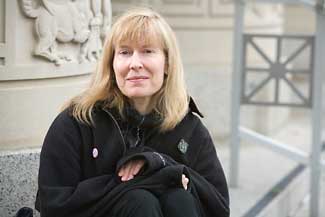The Virginia Tech shootings last month drew new attention to issues of mental health among college students. Although Louise Freymann serves U-M as an academic advisor, she and her colleagues know that their work may involve helping students find resources for coping with mental health concerns.

“There is no simple, one-size-fits-all approach to students here, but clearly the health and safety of all the staff and students who come to our office is of paramount importance,” says Freymann, an academic advising coordinator.
“Certainly if a student ever seemed to pose an immediate threat to others, we would call the Department of Public Safety (DPS) right away.”
Freymann and more than 30 other counselors advise students at the Newnan LSA Academic Advising Center. Although their jobs are to help students with their academic life at U-M, not handle personal counseling, academic advisors have the opportunity to attend training sessions run by representatives from both Counseling and Psychological Services (CAPS) and University Health Service on how to deal with nonacademic issues. Freymann says a key challenge, at times, is getting students to go to professional mental health counselors for the help they need.
Recognizing this, CAPS last year launched Question, Persuade, Refer (QPR), a program that trains advisors to recognize warning signs of distress in students and develops skills to persuade them to get professional help. Like CPR, QPR is easy to learn and can be applied by people outside of mental health professions.
“If students aren’t physically and psychologically healthy, it is extremely difficult for them to focus on coursework,” Freymann says. “There are things that have higher priority than academic success.
“One of the reasons why I like advising at U-M is because our office helps make a huge place smaller and more welcoming,” she says. “It’s important to have someone who will get to know you over time and help you pull all the various threads of your college experience together.
“College is such an exciting new chapter in a student’s life. It’s the first time the student is away from home for a sustained period, and this calls for a lot of growing up that is both thrilling and scary. A student needs to make choices and accept responsibility for them, and I love being there to help in that process.”
When a student comes in for help, Freymann says, “I start out very general, saying something like “What can I do for you?’ and then see where the student goes with it. Often students are unsure of their major/concentration direction. Questions will frequently grow out of that.”
Besides counseling students, Freymann also stays current with other LSA academic counselors. She coordinates a forum for veteran and new advisors at the start of each academic year, pulls together an annual advising summit in the fall for all LSA departments, organizes a Concentration Fair in March, and with her colleague Susan Doyle coordinates an annual advising conference in May that brings together advisors, faculty, and administrative staff across campus.
Off campus, Freymann recently tackled a new interest. “I decided five years ago, when I was 45, to start taking viola lessons. Who says older people can’t learn something new?” she says.
“I wanted to do something that was creative, would involve an unfamiliar kind of thinking and would be beautiful. I don’t know that it’s beautiful yet, but I’ve stopped scaring my cats. I had never studied a stringed instrument, but have always loved the strings in an orchestra.
“People ask me, ‘Why viola?’ and I say, ‘Why not?’ I’m hoping to master that ever elusive vibrato sometime before I die.”

